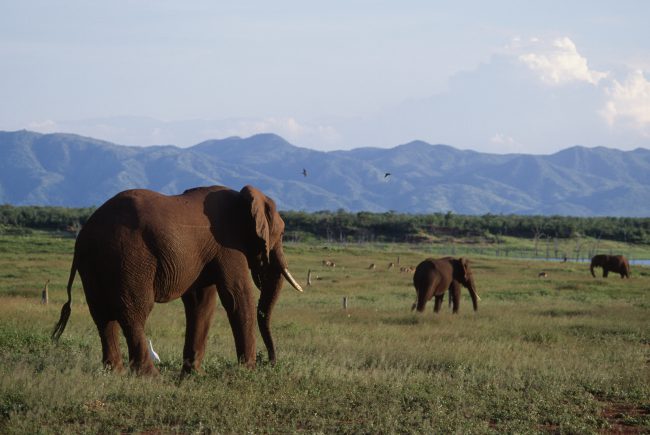WASHINGTON — The Trump administration has quietly decided once again to allow Americans to import the body parts of African elephants shot for sport, despite presidential tweets decrying the practice as a “horror show.”

President Donald Trump personally intervened in November when the U.S. Fish and Wildlife Service first said it would lift an Obama-era ban on elephants imported from Zimbabwe and Zambia. The agency contends that encouraging wealthy big-game hunters to kill the threatened species would help raise money for conservation programs.
READ MORE: Cecil the lion’s 6-year-old son shot dead by trophy hunter
“Big-game trophy decision will be announced next week but will be very hard pressed to change my mind that this horror show in any way helps conservation of Elephants or any other animal,” Trump tweeted on Nov. 19, placing the policy on hold after a public backlash to the earlier decision.
WATCH: Animal activists blast Trump’s reversal of elephant trophy killing ban

More than three months later, the federal agency overseen by Interior Secretary Ryan Zinke issued a letter dated March 1 announcing that the importation of elephant trophies will now be approved on a “case-by-case basis.” The letter cites a December ruling in a long-running lawsuit challenging the ban filed by Safari Club International and the lobbying arm of the National Rifle Association.

Get breaking National news
Zinke recently told people privately that Trump has called him several times to discuss what to do about elephant trophies. Nether the Interior Department nor Fish and Wildlife issued a media release over the last week to announce the decision, which was quickly condemned by environmental advocates.
WATCH: Trump lifts ban on elephant hunt trophy imports

“The Trump administration is trying to keep these crucial trophy import decisions behind closed doors, and that’s totally unacceptable,” said Tanya Sanerib, international legal director at the Center for Biological Diversity.
“Elephants aren’t meant to be trophies, they’re meant to roam free.”
Trump’s two adult sons are trophy hunters. A photo of Donald Trump Jr. holding a knife and the bloody severed tail of an elephant he reportedly killed in Zimbabwe in 2011 has sparked outrage among animal rights activists.
READ MORE: New report says half of Canada’s wildlife species are in decline
Zinke is an avid hunter who after arriving at Interior last year ordered the arcade game “Big Buck Hunter Pro” to be installed in the employee cafeteria at the agency’s Washington headquarters, a move he said would promote wildlife and habitat conservation.
In June, the department removed longstanding protections for grizzly bears near Yellowstone National Park, a step to potentially allow them to be hunted. The Fish and Wildlife Service also quietly began issuing permits in October allowing African lions killed in Zimbabwe and Zambia to be imported. Previously, only wild lions killed in South Africa were eligible.
WATCH: Trump administration wants to lift ban on importing elephant trophies

The world’s largest land mammal, the African elephant has been classified as threatened under the U.S. Endangered Species Act since 1979. A licensed two-week African elephant hunt can cost more than $50,000 per person, not including airfare, according to advertised rates.
READ MORE: A hunter was accused of shooting and killing a therapy dog, and now charges are pending
Illicit demand for elephant ivory has led to devastating losses from illegal poaching as the natural habitat available for the animals to roam has also dwindled by more than half. As a result, the number of African elephants has shrunk from about 5 million a century ago to about 400,000 remaining. And that number continues to decline each year.
According to the United Nations, as many as 100,000 African elephants were killed between 2010 and 2012. For forest elephants, the population declined by an estimated 62 percent between 2002 and 2011.
- Border Patrol commander Greg Bovino leaving Minnesota after 2nd fatal shooting
- U.S. sending ICE agents to Winter Olympics in Italy for ‘security’
- 1 person shot, in critical condition in incident involving U.S. Border Patrol
- Vegas casino owner introduces ‘at par’ pricing for Canadian tourists amid slump







Comments